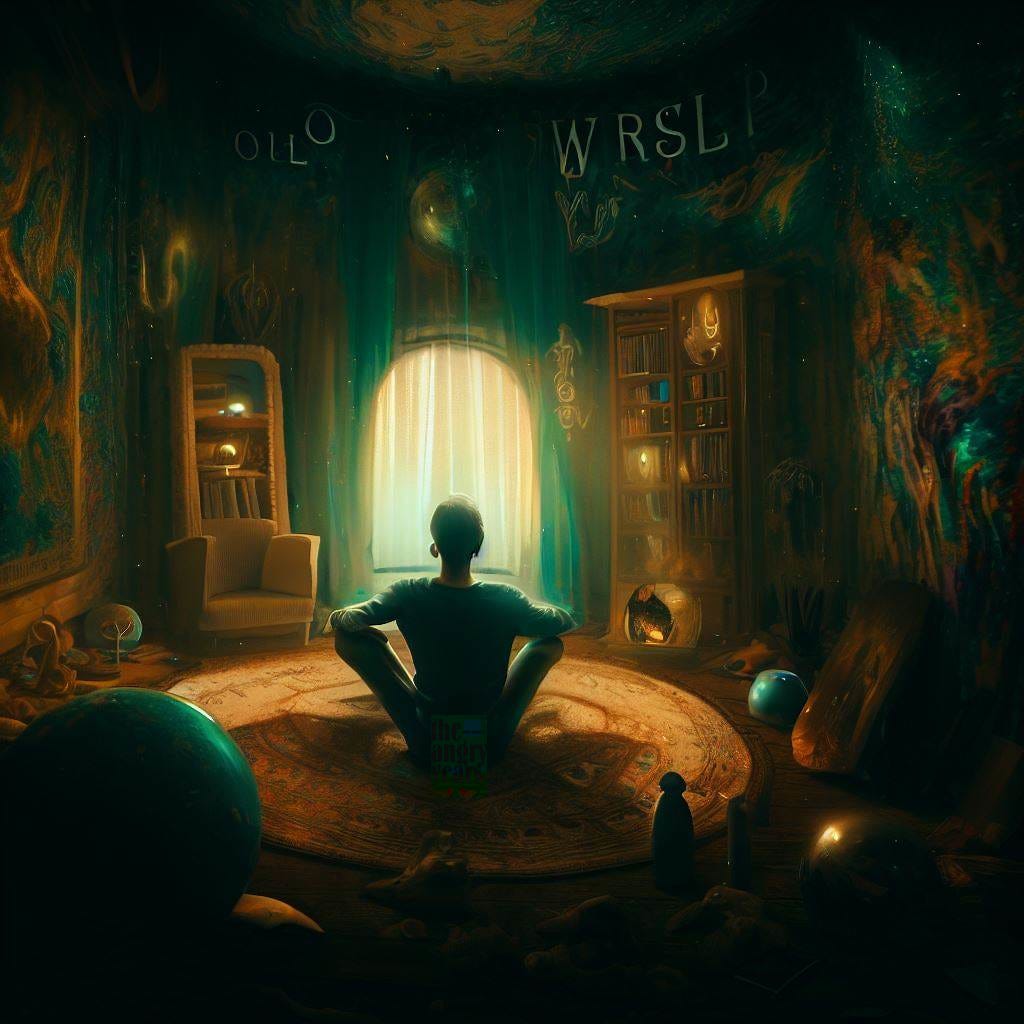Seeing the self for the world, we cannot see the world we do
Evidence for global cultural diffusion post at Vectors of Mind spurs the raising of the question in the comments by Little Kenny,
“[…] I am trying to imagine what might have been some of the more fundamental worldview changes and social practices triggered by recursion. Maybe they're now so embedded into our behavioral norms and unrecognized priors that we can't even see them...?[…]”
And I quickly said,
“separating the world from self for starters, then selfing and worlding in integrated fashion with others... so we can society along more better & stuff”
So I was pointing at what is it we can’t even see, part of this is the world, where we live. With individualistic foci we each see it from our point of view, strongly backed by evolutionary selective pressures on the individual as the vector of survival.
What we don’t see is what we are looking at…. —that the world (now) mediates that reality, and that mediation is mostly social, even if that is just you and your mum alone in the wilds of Siberia 40 000 years ago.
Just as narcissists mistake their own POV for the world (it is as much a worlding disorder as a personality disorder) we more selfless types mistake the world for various outcomes of organisation that we throw into the… —gap of unknowing, be they structures of collectivised individuals (the tribe), emergent performative leks of co-opetition, or baboon-like hierarchies of dominance that narcissists love, or whatever, we tend to see these as whatever these agreements say they are, and this world is then reality as a principle.
My basic point is that the urge to world/world-build/moralise/should/hope/tomorrow-ise is as deeply ingrained in us as any focus to recursively feedback into meditations and anxieties about our good selves, as we look out into the world that is built recursively as a set of steps, like/as a toolmaking exercise, mostly social in concern, regardless of whether this thing is an object (requiring structural analysis) or a proper thing that emerges by individual actions in everyday choices with styles trad and/or personally idiosyncratic as we swash and shashay about.
The worlding / world-building is always done from an embodied POV, or three, as much as the embodied POV is selfing in their skin (among others). It is part of the extended phenotype, and perhaps unlike in many animals, this umwelt holds a further shared endeavour of effort, which a focus on psychology and individual POV(s) cannot see, or is at least averting their eyes from.
It’s possible that both worlding and selfing are the same process (they happen in the same thing… —our bodies) with different foci.
Often we look to the placement of where someone _is_, physically or geographically, to cover what is lately known as diversity of viewpoints and experience, with additional layers of intersectionality pointing out the complexity of experience that arise in the world/s we create, as economies become more complex. Even if studies of intersectionality are just demographic marketing research by other means. (Or at least methodology.)
But all this still looks at/to peeps as POVs in the world, which arises out of reality like a dragon from smoke. The ‘reality’ is the world arises from us as we self with others. Otherwise it is still just us. (That is a deliberate contra-pun folks.)
The difference here, is, we world away as we self along, and this is not done alone. But none of this is clear if we cannot see it, let alone see eye to eye on definitions as to how to describe it.
Most methodologies have difficulty dealing with this in specialised departments of knowledge even as they cross-fertilise and pride themselves on hybridising fields of knowledge for reasons of creativity, these themselves can become a focus for a concentration on a “core business” while developing an “everything app” or one god to rule them all in one empire and in the darkness bind them. When they cross-fertilise they multiple system complexity in trying to integrate them, for reasons of utility and creativity. Each world become grounds for a new landscape of movement, derivatives of action….
When we self and world we do this integration already.
So much so we cannot see it, and we get lost in believing in things, or gnostically knowing which animism is more accurate. Or more fit for purpose and in that darkness binds them.
If I was younger I would say poetry does this , or is aware of this but, really that is all poetry has been allowed to do (as a skerrick of its former life) … —as this selfing/worlding fails to be seen by the rest of us at work, recursively focussing on our toolmaking abilities, or being used like tools themselves (slavery).
The other side is the study of difference or diversity in selling stuff to peeps as they built their little rooms of their own, where the world is compressed into a cell of one’s preferences, and the odd need.
I just need… —
What might be better is consider that personality “differences” (not just disorders) world differently when they self:
extraverts think in the world / introverts think in a closer world
extraverts sharethink a world more easily / introverts excuse themselves
Now demographically intersectionally multiply this by all the splits in self and world you can muster. You bias will limit what you do as much as your capabilities. Your strengths are also your weaknesses.
Meta-commentary — January 2025 as I migrate this piece to whyweshould.loofs-samorzewski.com. I think this post in August 2023 is where I completely shift over to ‘worlding’ rather than ‘world-building’, and deprecate ‘world-building’ to refer to bad but intentional worlding.






